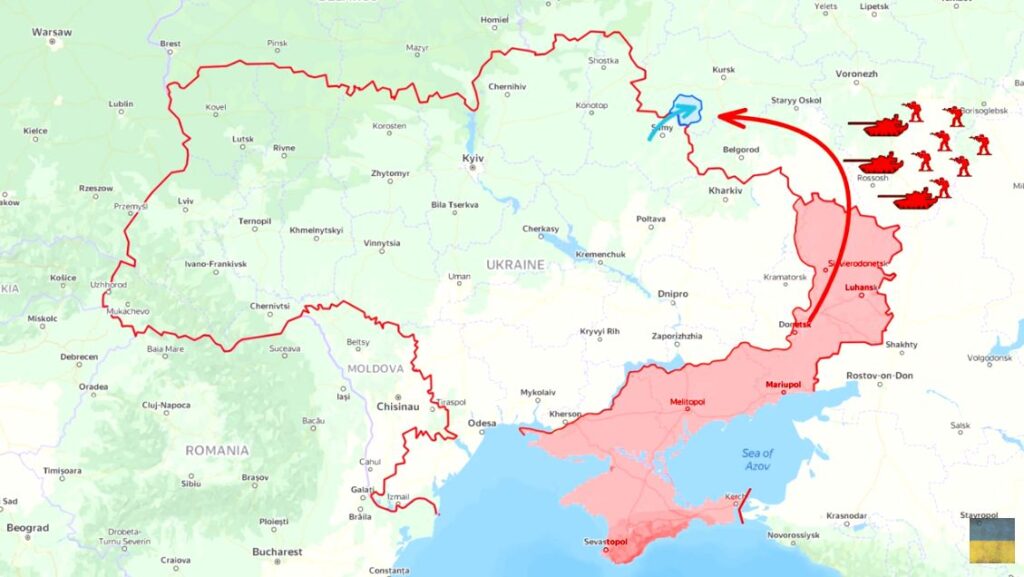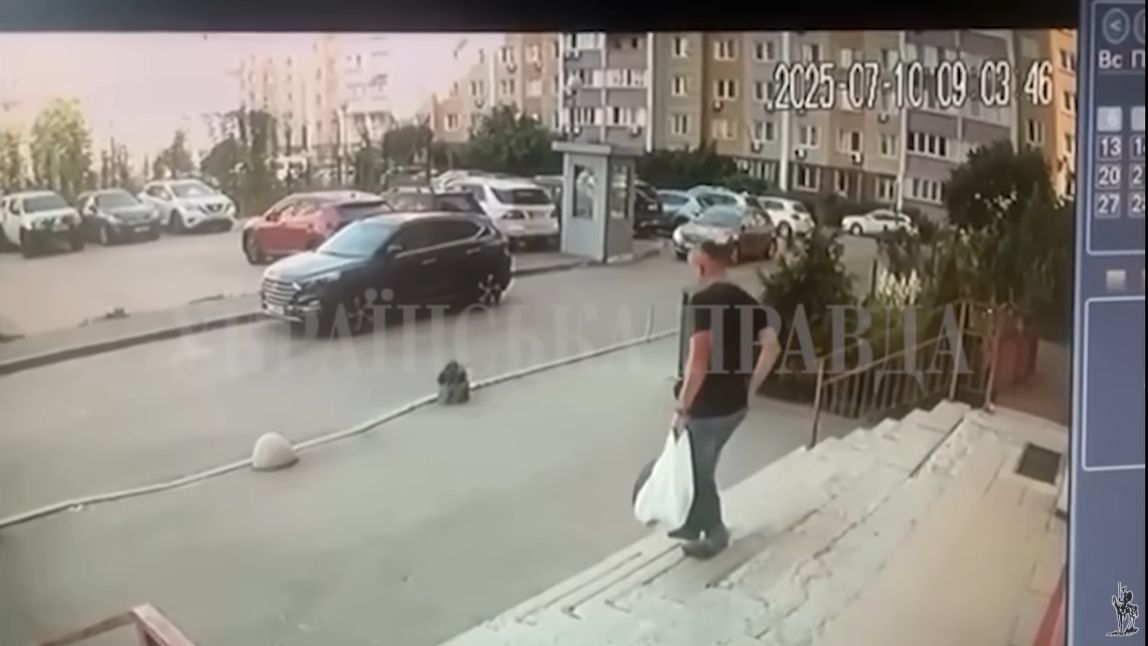The morning of 10 July started like any other for Colonel Ivan Voronych. Around 8 AM, the veteran Ukrainian Security Service officer stepped out of his apartment building in Kyiv’s Holosiivskyi district, likely heading to another day of what had become Ukraine’s most dangerous work – running covert operations against Russia.
He never made it past the parking lot.
A gunman approached and fired five shots from a silenced pistol. Voronych died instantly from multiple penetrating wounds. The killer vanished in an SUV, leaving behind a crime scene that would send shockwaves through Ukraine’s intelligence community.
According to Roman Chervinskyi, the former intelligence officer who broke the news, this wasn’t random violence. The five point-blank shots, the silenced weapon, the clean escape – everything pointed to a professional hit.
Commander of the gray zone
This wasn’t just another intelligence officer. The New York Times reports that Voronych (also spelled Voronich in some reports) served in the SBU’s elite Alpha Special Operations Center and had spent decades building Ukraine’s most sensitive capabilities against Russia.
His career reads like a spy thriller. Starting in the mid-1990s, Voronych eventually commanded what the NYT describes as “a unit that received technical support from the CIA” and was responsible for eliminating high-level Russian proxy commanders.
This CIA-supported Fifth Directorate eliminated Russian proxy commander Arsen Pavlov (“Motorola”) in Russia’s puppet Donbas “republics” in 2016. His unit played a key role in Ukraine’s August 2024 cross-border offensive into Russia’s Kursk Oblast.
But the decades between reveal little about his other operations – a silence that speaks to the classified nature of Ukraine’s most sensitive work against Russia.
After Russia’s full-scale invasion, Voronych became part of what sources call an elite unit operating in the “gray zone” between front lines.
Chervinskyi described Voronich as “one of those who started a direction in the Service that now creates many problems for the orcs” – Ukrainian slang for Russian forces.
An unprecedented target
What makes this killing significant isn’t that it represents some fundamental shift in the shadow war—both sides have been targeting each other’s operatives for years. Ukrainian intelligence has assassinated “dozens” of Russians since the invasion began, reaching deep into Russian territory with car bombs and targeted shootings.
Russia has struck back before. Maksym Shapoval, a key figure in Ukraine’s 2016 Crimea operations, was assassinated in 2017. There was an attempt on current military intelligence head Kyrylo Budanov in 2019 and his wife in 2025.
But the targeting of someone like Voronych appears unprecedented in terms of seniority and operational significance since the full-scale war began. This was a decades-long veteran with deep CIA connections who had been instrumental in some of Ukraine’s most sensitive operations against Russia.
The Russian fingerprints
More than 24 hours after the killing, Ukrainian police and the SBU continue investigating, but no suspect has been publicly identified. The silence is telling.
Former SBU officer Ivan Stupak doesn’t buy into any domestic motive.
“99%—Russian special services chose him as a target,” he told Espreso TV. “Five bullets with a silencer rules out any possibility this was some personal dispute or neighborly grudge. This was a professional hit.”
The targeting itself suggests serious intelligence penetration. The FSB infiltration of Ukrainian security services is well-documented – this February, SBU chief Vasyl Maliuk personally arrested a high-ranking traitor in the SBU’s Anti-Terrorist Center who had been feeding intelligence to Moscow since 2018.
Russian military bloggers welcomed the killing and suggested Moscow was responsible. The Rybar channel, linked to Russian military intelligence, said there were “plenty of motives for eliminating this SBU employee.”
Voronych played key role in Kursk incursion
The timing and target suggest this may be long-delayed payback. Voronych’s involvement in the 2016 Motorola assassination has now been made public through NYT reporting. Pavlov was a beloved figure among Russian-backed forces—his killing was a major psychological blow that Russian commanders never forgot.
Former SBU chief Ivan Bakanov, who knew Voronych personally, told the NYT the implications are stark: “If the motive is a domestic murder—that’s one thing. But if this is a public execution carried out by Russians—that’s a completely different story that requires an immediate response.”
After Russia’s full-scale invasion, Voronich became part of what sources call an elite unit operating in the “gray zone” between front lines. His unit played a key role in Ukraine’s bold August 2024 cross-border offensive into Russia’s Kursk Oblast, according to NYT.

The Kursk operation marked a watershed moment in the war. Although the strategic outcomes of the incursion remain debated, it undoubtedly demonstrated to Ukraine’s Western partners that Ukraine has the capability to conduct daring raids and that Russia is not invincible.
As US and UK intelligence chiefs noted, the operation was “a significant tactical achievement” that exposed Russian vulnerabilities.
Perhaps most importantly, the offensive laid Russia’s nuclear threats bare—showing them to be empty rhetoric designed to manipulate Western support for Ukraine. The operation “succeeded in making a complete mockery of Vladimir Putin’s red lines,” as one analyst put it, yet no nuclear escalation followed. This pattern of nuclear intimidation remains the main constraint on Western support for Ukraine’s victory plans.
Escalation of the shadow war
The assassination doesn’t change the fundamental rules of the shadow war – those have been evolving for years as both sides have escalated their targeting campaigns. But it does represent something significant:
The successful Russian elimination of one of Ukraine’s most experienced covert operators, someone whose institutional knowledge was irreplaceable.
It also raises uncomfortable questions about security. How did assassins penetrate Kyiv’s defenses to eliminate such a high-value target? Ukrainian security experts note that more than a day has passed without any official suspect description or wanted notice – suggesting this was no ordinary crime.
Ukraine’s capital not safe for its own spies
This assassination fits into an escalating shadow war where both sides have been eliminating each other’s operatives with increasing sophistication. Ukrainian intelligence has been actively targeting Russian officers implicated in war crimes since the full-scale invasion began.
The targets have been high-profile and devastating to Russian operations.
- In December 2024, chemical weapons chief Igor Kirillov was killed by a remotely detonated explosive outside his Moscow apartment building.
- In April 2025, Lieutenant General Yaroslav Moskalik died in a car explosion near Moscow. Russian drone program chief Colonel Aleksey Kolomoytsev was eliminated in Moscow Oblast in September 2024.
- These operations have reached beyond military targets. In May 2025, former Ukrainian official Andrii Portnov, who fled Ukraine and supported Russian aggression, was shot dead outside an elite Madrid school where he was dropping off his children.
For Ukraine’s intelligence services, Voronich’s death represents both a devastating loss and a troubling escalation. The decades of operational knowledge that died with him cannot be replaced overnight. While senior Ukrainian intelligence officers like Budanov already live under heavy security after multiple assassination attempts, Voronich’s killing suggests Russia’s capabilities in Kyiv have improved.
The success of this operation – no arrests, no public suspect description – indicates a level of operational sophistication that should concern Ukraine’s remaining intelligence leadership.





